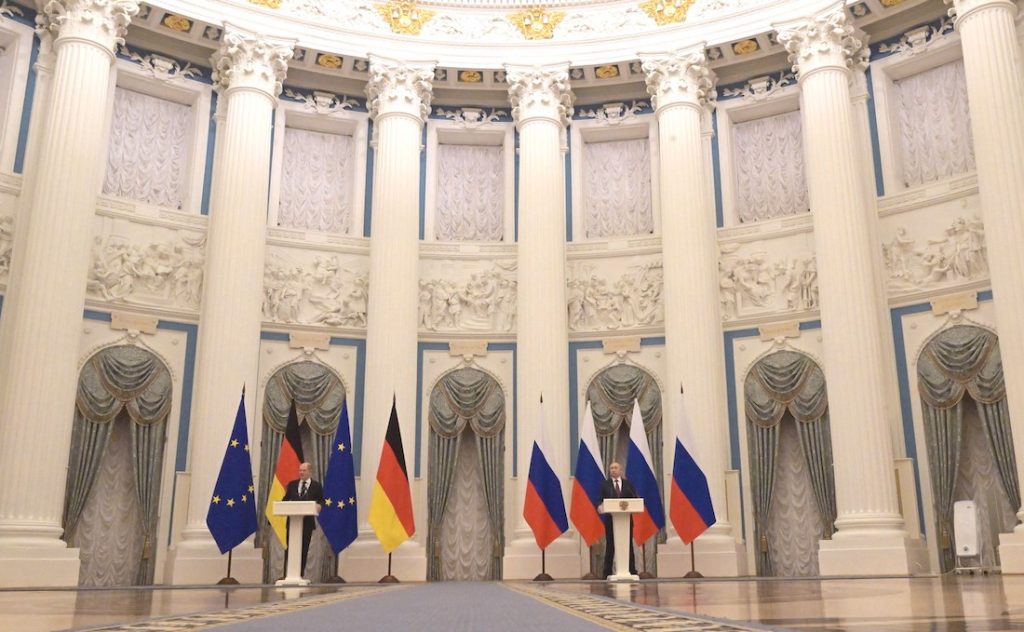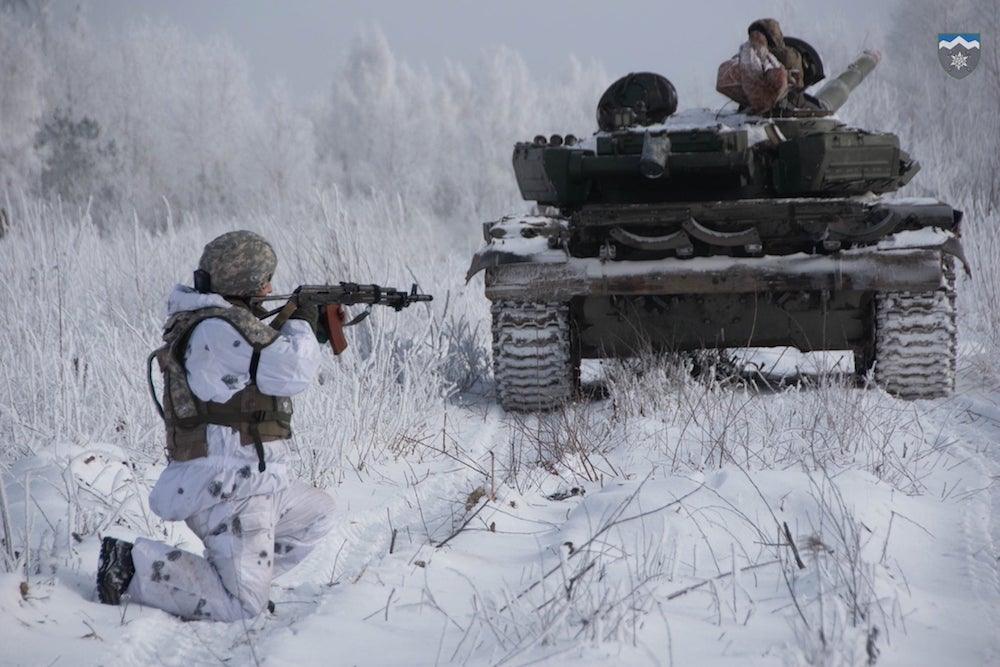Will Putin recognize independence of Donetsk and Luhansk People's Republics?
Will Russia recognize independence of Donetsk and Luhansk People’s Republics?
The Russian State Duma has called on President Vladimir Putin to recognize the independence of Donetsk and Luhansk People’s Republics located in the eastern Ukraine. This is happening amid escalation of the conflict over Ukraine and an ongoing threat of a full-fledged Russian invasion of the neighboring country. Analysts say the decision is Putin’s new leverage to put pressure on Kiev and force Ukraine to accept Russia’s plan to resolve the conflict.
On February 15, deputies of the State Duma of Russia by a majority vote adopted an appeal to President Vladimir Putin recognizing the independence of the self-proclaimed Donetsk and Lugansk People’s Republics in eastern Ukraine.
The deputies considered two resolutions: one was submitted by the Communist Party of Russia back in January. It provided for sending an appeal for the recognition of the self-proclaimed republics directly to Putin.
The second draft appeared on February 14 – it was submitted by deputies from Putin’s United Russia party. They, unlike the first document, suggested not immediately turning to President Putin with a request to recognize the “LPR/DPR”, but first holding consultations with the Russian Foreign Ministry.
According to the Russian newspaper Novaya Gazeta, the Communists criticized the second resolution, believing that it would delay the decision.
As a result, 351 deputies voted for the draft resolution of the communists, and 310 voted for the United Russia document. Thus, now the deputies must send an appeal directly to Putin.
- Is Russia actually preparing to invade Ukraine?
- ‘Finlandization’: shadow diplomacy around Russian-Ukranian crisis
President Putin’s response
The Russian President announced his position on the recognition of the “people’s republics” on the same day, at a press conference following talks with German Chancellor Olaf Scholz in Moscow.
“I will proceed from the fact that we must do everything to solve the problem of Donbss, but do so in accordance with the the Minsk agreement (on a ceasefire in Donbas) which has not yet been fully implemented”, Putin was quoted by the Ukrainian publication Hromadske.
According to him, the State Duma, when deciding on the appeal, “focused on public opinion”.

Putin then said that he hopes that “partners across the ocean and in Europe will exercise the appropriate influence” on Kiev so that “the solution can be found”.
In turn, the German chancellor noted that Moscow’s recognition of the “LPR/DPR” would be a “political disaster”. He called on all parties to return to the Minsk agreements.
He also said that Ukrainian President Volodymyr Zelensky promised him the day before that Ukraine would soon prepare bills on the status of Donbass and amending the constitution.
Ukraine’s position: recognition will end peace agreement
Russia’s recognition of the “LPR/DPR” will mean its “conscious withdrawal” from the Minsk agreements. And this will strike a blow to the diplomatic settlement of the war in Donbass, the Ukrainian Foreign Ministry said.
“Recognition of the ‘L/DPR’ will not have any legal consequences. Russia will not be able to pass off the Russian occupation administration in the temporarily occupied territories in the Luhansk and Donetsk regions as “independent entities”, as well as hide its participation as a party to the armed conflict in Donbas”, the Ukrainian Foreign Ministry said.
Kiev believes that if Putin supports the State Duma’s decision, such a decision “will have devastating consequences” for the international legal order.
What are the Minsk agreements and why the parties interpret them differently
The document – already the second in a row – on the settlement of the armed conflict in the east of Ukraine was agreed on February 11-12, 2015 in Minsk by the leaders of Germany, France, Ukraine and Russia in the format of the so-called. “Norman Four” after tense negotiations.
It was signed by representatives of Ukraine, Russia, the OSCE and the unrecognized “people’s republics”.
The agreement, in particular, provides for:
- Ceasefire, withdrawal of heavy weapons from the line of contact and exchange of all prisoners and hostages
- Adoption by Ukraine of the law on the special status of certain regions of the Donetsk and Luhansk regions
- Amnesty for participants in the conflict
- Conduction of local elections in accordance with Ukrainian legislation and under the supervision of the OSCE
- Withdrawal of all foreign troops and mercenaries, disarmament of illegal armed groups
- Transfer of control over the border with Russia to the official structures of Ukraine
- Participation of local authorities in the appointment of judges, the creation of a local “people’s militia”
- Amendments to the Constitution of Ukraine with a view to its decentralization
Most of these items have not yet been implemented. The parties blame each other for it. Moscow accuses Kiev of the fact that Ukraine has not yet adopted a law on the special status of the territories of Donbas, and not making appropriate constitutional amendments.
Kiev, on the other hand, accuses Moscow of not withdrawing its troops from Ukrainian territory.
Many in Ukraine fear that Kiev’s unilateral compliance with all the terms of the agreement will turn Ukraine into a divided country with a Russian-controlled enclave within it, giving Moscow leverage to influence Ukraine’s domestic and foreign policy.
Thus, the implementation of the Minsk agreements would be a very unpopular measure for the Ukrainian authorities.
According to the results of the polls cited by Hromadske, 54% of Ukrainians are in favor of revising the Minsk agreements, and 21% are in favor of completely abandoning them, only 12% of the respondents unconditionally support the implementation of agreements.
Expert commentary
The Russian publication Kommersant in the article entitled “Forcing Minsk” refers to its sources in the Putin administration and claims that “the president will make a decision based on the results of his negotiations on international security guarantees with the leaders of Western countries”.
Another source of Kommersant, close to the administration refers to the appeal of the State Duma as “another mechanism for forcing Ukraine to comply with the Minsk agreements”.

“The ball is now on the side of Vladimir Putin – the final decision is his”, writes Boris Vishnevsky, a columnist for the Russian Novaya Gazeta.
“But even if he refuses to support this decision, it will be much more difficult to continue to fulfill the traditional mantras of the Russian authorities about Ukraine’s unwillingness to comply with the Minsk agreements. Because now these agreements, if not completely disavowed, are very seriously undermined”, Vishnevsky believes.
Oleg Ignatov, consultant to the International Crisis Group, in turn, believes that it is in Russia’s interests now to maintain “tension and uncertainty about its actions, so that no one understands what Russia wants and so that its next step is unexpected and unpredictable, and everyone is in semi-panic situations.
“I see no reason for Russia to recognize the DNR and LNR. Imagine if Russia recognizes the republics – Germany, France and everyone will say that Russia withdrew from the Minsk agreements. What will Russia talk about with Ukraine then, what claims will it make against it? What will Russia get?”, Ignatov is quoted by the BBC.
Analyst Maria Zolkina writes in the Ukrainian edition of European Pravda that the Kremlin currently has “two basic options”.
The first is not to recognize, but to offer another “victory”.
“Putin can choose not to recognize the L/DNR and, as a result, find himself in a losing position unless he achieves significant concessions from Ukraine”, the expert believes. “In particular, the implementation of the political clauses of the Minsk agreements”.
An alternative scenario is that Putin recognizes the independence of these entities. This can happen either in the coming days, or a little later, if the attempt to bargain for something from the West and Ukraine fails, the expert believes.
In her opinion, “such a scenario diplomatically plays into the hands of Ukraine, since Russia will be guilty of withdrawing from the Minsk agreements for all Western governments”.
However, with a high degree of probability, this also increases the risks of a large-scale military escalation.
In this case, Russia can implement the same scheme as in Abkhazia and South Ossetia – openly deploy its troops in the Ukrainian Donbas, the observer believes.


















